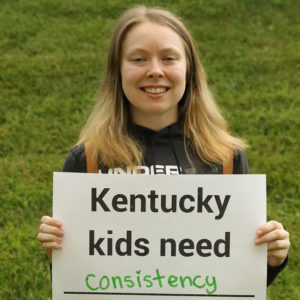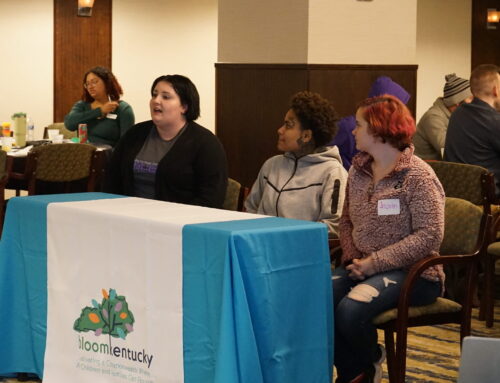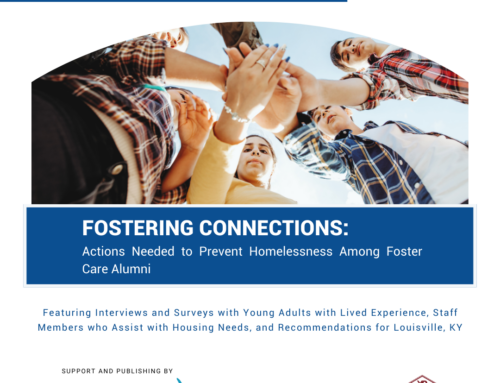This post originally appeared as an op-ed in the Courier Journal on December 15, 2021
By Cynthia Schepers.
 My name is Cynthia Schepers and I am one of the “young adults” who helped lead the research on young adult access to behavioral health supports alongside the Coalition Supporting Young Adults, or CSYA for short. As a former foster youth, I found it very impactful that I could use my experience to drive change. A lot of people had concerns on whether this process could even be youth-led, because of the possibilities of triggers that come with these topics. In response, I would like to state that it is not our job to avoid being triggered, but instead, it is our duty to find a way to participate in some form of healing so that we can deal with triggers as they happen. The youth who become leaders know what we are signing up for, and we do it anyway because it is important to us that we find a way to make the youth who are like us better equipped with mental health resources.
My name is Cynthia Schepers and I am one of the “young adults” who helped lead the research on young adult access to behavioral health supports alongside the Coalition Supporting Young Adults, or CSYA for short. As a former foster youth, I found it very impactful that I could use my experience to drive change. A lot of people had concerns on whether this process could even be youth-led, because of the possibilities of triggers that come with these topics. In response, I would like to state that it is not our job to avoid being triggered, but instead, it is our duty to find a way to participate in some form of healing so that we can deal with triggers as they happen. The youth who become leaders know what we are signing up for, and we do it anyway because it is important to us that we find a way to make the youth who are like us better equipped with mental health resources.
First, for our research, we had to find out what questions were most critical to ask the youth, and the questions had to be detailed because youth do not always know what their needs are, or what realistic service they could ask for. We tackled big topics in mental health such as what resources the youth felt were currently available to them, and any resources they felt were not available but needed to be. We also opened the floor and made some time to talk about suicide prevention services, both currently available and lacking within the system. We talked about if services are available, what stops a young person from utilizing those resources and we heard multiple answers including location, stigma education, etc.
One of the biggest themes that we discussed multiple times was the education of the support and services, that is one of the biggest reasons youth are not utilizing services is simply because they haven’t heard about them. It was not a shock to hear this information, education of support is something I have always been passionate about, but now I have the research to back up that need. Even just us participating in this research gave us the opportunity to educate young adults about resources, because when we would ask about what services the youth felt like they needed, sometimes it would be something that is already in existence, and at that point, we are able to let them know. Education of resources is a no-brainer, we need to share this information with as many youths as possible because it could have an outstanding ripple effect if the youth go on to educate their friends and peers.
Giving youth a voice is the only way to fix this system, they are the ones who experience the hardships we are trying to fix so they are the ones who should tell us what they need which is why I appreciate the trauma-informed methods we establish to maintain emotional safety. I am hopeful this information we collected can make a large amount of change, it is just crucial that we all advocate for, and educate the young adults in our lives. The youth voice has presented us with themes we discussed include the stigma against utilizing mental health resources, lack of trust for the services provided, location of services and lack of personal awareness of issues present. Some recommendations we discussed to tackle these barriers include, but are not limited to, emotional literacy training, self-advocacy skills training, peer-to-peer support networks and equity in resource availability. Now that we have the research that says what we need, we have to find ways to practically implement them, and we need all the help we can get.
It was truly an honor being able to work on this project because as the report states, the youth long for peer support. Having trauma-informed peer support running the focus group helped youth to be more open because even if we never had contact until this point, there is a trust that comes with someone sharing similar negative experiences. One thing I always love to say is that the reason I love being a peer support and advocate is that it gives my story purpose. I have experienced a lot of hardships, but I use them to change the narrative by sharing my story and making lots of changes within the system. I am not a helpless victim of the system, I am a fearless leader with a passion for helping young people lead better lives, and being a part of this project was a huge piece of that.
Cynthia Schepers is a member of the Home of The Innocents Youth Action Board (YAB) and was one of the 4 principal youth leads for CSYA’s Youth Mental Health Research Project.





